- Home
- Jason Webster
Guerra Page 26
Guerra Read online
Page 26
‘Kiki told me you’re interested in the Civil War,’ he said.
I nodded, and without any prompting he started telling me the story of his grandfather.
Raimundo had been Javier’s hero – a poet and a Republican, he had been exiled to Mexico after Franco’s victory, but had returned to Spain in the early seventies, shortly before the dictator died, as the regime very slowly began to liberalize and pardon those it had fought against almost forty years before. He brought with him a son – Javier’s father; his Mexican wife had died of emphysema.
‘I’m a quarter Mexican. That’s why there’s an Aztec look about me,’ Javier said with a smile. I hadn’t noticed before, but now he mentioned it there was something about his cheekbones, and a glossiness about his very dark hair.
Raimundo had always been extremely close to his little grandson, and had been more of a father than a grandfather to him as Javier’s own father passed restlessly through a series of jobs and relationships, never quite managing to settle in a country he had always been told was his real home. Eventually he had gone back to Mexico, leaving Javier in the hands of his Spanish mother and Raimundo. He hadn’t been in touch for years. While his mother was out at work, the little Javier would sit with his grandfather, hearing stories about his time in the war, the ideals they had fought for, and his escape and journey to Mexico. Raimundo had been involved in schemes to expand the education system in Spain during the early years of the Republic, bringing schools and teachers to rural areas where no one could read or write. But the war had come and he’d been shipped down to Valencia when the government debunked en masse from Madrid, and had then gone up to Barcelona for the last year of the conflict. He’d been one of the hundreds of thousands who’d walked through the snow over the Pyrenees into France in the final months as Franco’s troops conquered Catalonia. And like so many others, once over the border he’d been imprisoned by the French authorities in a concentration camp not a great distance away from where Javier and I were now sitting.
Bullied by Britain and fearful of civil conflict within France’s own borders, various French governments over the course of the war had failed to give the Spanish Republic the kind of assistance it would have needed to defeat Franco’s army. Despite being of the same political bent as its Spanish equivalent – it was even called the Popular Front – the government in Paris preferred to maintain better relations with London, where the policy of first Baldwin and then Chamberlain was to prevent weapons from reaching Spain’s elected government. Threats were even made at one point that Britain might tear up its historic accord with France and ally itself with fascist Italy and Nazi Germany if the French gave military assistance to the Republicans. And so France, ever the great hope to the north, failed to help its southern neighbour in any significant way and the Nationalists inched their way to victory. Worse, however, was yet to come.
By early 1939 a new government was in power in Paris under Edouard Daladier, a supporter of Chamberlain’s appeasement policy towards Hitler. France now faced the reality of thousands of Spanish Republicans pouring over the border as they fled Franco and his bloody retribution. The refugees were seen as a threat – many of them were armed men who might bring their war with them. And so these tired, wounded, hungry, defeated people were rounded up as they crossed the border, stripped of their personal belongings in many cases, and placed in makeshift concentration camps in the area around Perpignan. Out of half a million Spaniards forced into exile at the end of the war,275,000 passed through French hands. It was mid-winter and illness was rife, but no shelters or decent food were provided. Forced to survive on the bare ground, the refugees had to dig into the frozen earth with their hands to create some kind of shelter, washing themselves if they could in the icy salt water of the Mediterranean. Bread and a few other scraps to eat would be handed out, but there were virtually no medicines or treatment for the sick and wounded. Almost fifteen thousand died in the camps during the first six months. They were simply les rouges espagnoles – undesirables, facing death or destitution in their own country just a few miles away, or rejection in France from those they’d hoped would be their friends. The doors of Europe were closed to most Spanish refugees. There were few places to go.
Some, like Raimundo, were lucky and managed to make it to Mexico, one of the few countries that had supported the Spanish Republic throughout the war. Others were forcibly conscripted into the French Foreign Legion or joined the French in their fight against the Nazis only months later.
Javier told me all this in a hurried voice, aware that our time was short. A guard called out from the corner. They would soon be booting us out.
Stuck in the concentration camp, Raimundo might have ended up like so many others, but was recognized by a Republican government official with contacts, who made sure he was given passage to Mexico. But for that man, Javier said, he himself probably wouldn’t be alive now.
Raimundo had started afresh in Mexico, marrying a local woman and fathering a son. But like so many Spanish exiles, he dreamed of going home one day, and watched the Spanish news avidly for signs that the enemy who had defeated them years before might crumble and democracy be restored once more.
Eventually, after the death of his wife, he had decided to move back anyway while Franco was still alive, sensing that change was on its way and keen to catch it when it came. He was right: he lived to see the death of the dictator and the subsequent rapid collapse of the regime in the mid-1970s.
‘In the end,’ he used to tell Javier as a boy, ‘Franco lost and el abuelo Raimundo won.’ Franco might have had all the tanks and guns, but he didn’t have time. ‘Time,’ he would say, ‘was on our side.’
Javier’s grandfather had died four years earlier at his home. Few things stayed the same for very long, he had said, but Spain was a democracy once more and he had seemed at peace. There was, however, one thing remaining he had always meant to do.
‘Listen,’ said Javier, ‘could you do something for me?’
I picked up the flowers from a florist’s in the centre of Perpignan and caught a train out to the coast. Argelès was a typical Mediterranean resort town, with views to the south of the rich green foothills of the Pyrenees lazily cascading into the water. Restaurants and beach apartments lined the sea front, with decorative palm trees and promenades for the holiday-makers, and playgrounds for the children. Now people paid money to come and lie on these sands, but fewer than seventy years earlier the beach had been a prison camp, a squalid and dirty open space with barbed-wire fences, where a hundred thousand Spaniards had been left to the elements while the world forgot about them and congratulated itself on having prevented another world war.
I walked along the shore, gusts of warm grey wind blowing in from the sea. The place was deserted, just a handful of bars still open at this tail end of the season. Already houses and villas were boarded up in preparation for the winter, adding to the nostalgic end-of-the-holidays feeling. Out at sea, tankers floated like miniature islands on the horizon, barely moving on the still, grey waters. A couple of seagulls cried mournfully overhead.
I tried to imagine the conditions that had existed here all those years ago, when Raimundo, then a young man, had been one of the many thousands held captive on this very shore. I’d seen photographs of the refugees with exhausted, defeated faces, men standing skinny and naked as they tried to wash their few scraps of clothes in sea water. There was nothing, though, like the image Raimundo had implanted in his grandson’s mind. He had made a big impact on Javier. In some ways Javier seemed almost proud to be imprisoned here himself, as though he were following in his hero’s footsteps. The future move to Seville was in the same vein: Raimundo had been born there before the family moved up to Madrid when he was a child. Perhaps in Andalusia Javier might feel at home.
A wounded militiaman had been in the camp, Raimundo had told him, just a few feet from where he and two other friends had tried to dig some kind of shelter. Shot through the lung, the man had d
eveloped tuberculosis, and with the cold and the hardship of the trek up to France in the snow, had had little strength left to take care of himself. He lay motionless on the hard, frozen sand, wrapping his greatcoat around him for warmth, his sickly breath hovering above his mouth like a fog. He was in his thirties, Raimundo thought, but his face was tired and grey, lines of defeat drawn along his increasingly pale skin. Gripped tight in his hands was a small framed photograph of a little girl. She was no more than three or four years old, with a centre parting and glossy brown hair falling down to her shoulders, a ribbon tied above one ear. Her face was bright, her large clear eyes filled with an expression of joy.
Raimundo and his friends tried to take care of the man, helping him walk the few paces to the sea to relieve himself during the first days, feeding him odd scraps to eat. But after a time he was unable to get up, even with their help, and he lay quietly on the beach, under a loveless sky, waiting for the illness to take its course. Still, though, he gripped the photograph in his fingers, pressing it to his chest with the little strength that remained to him, savouring the memory of the warmth of his lost little girl. She had used to dance sardanas, he had whispered to them.
There were no doctors or medicines to be had, and no way of getting hold of any from the French authorities. Raimundo and his friends did what they could, but the illness had taken him too far.
On the day the man died, the sun had come out briefly in the morning, tiny rays of light reaching the stiff, chilled bodies of the imprisoned refugees on the beach. For the first time in weeks half-smiles began to break out on people’s faces.
At lunchtime he stopped breathing. The French officials were informed but did nothing for several hours. The face of the little girl stared up into the sky, pressed to her father’s chest, smiling as she always had. Raimundo had never forgotten her.
By the following morning the man and the little girl had gone, her smile and expression of joy lost in the machine of French bureaucracy. By dusk that same day Raimundo himself was leaving the camp, taking his first steps towards a new life in exile in Mexico. He never found out the girl’s name.
I stood by the shore and watched the grey little waves rolling and stroking the sand in their curious, rhythmic motion. With their wrapping crumpled in my hand, I scattered the flowers on the water’s surface, where they were pulled out slowly by the current towards the south, down towards the Pyrenees and the border. Javier would have done it himself, he told me, but he knew when he got out he would be taken straight back to Spain. No time would be allowed for nostalgic visits to the nearby coast on behalf of his dead grandfather. I would be his representative, he’d said grandly, just as I was Kiki’s now in coming to see him. His grandfather, wherever he was, would be watching and would bless us both. Many loose ends had finally been tied up for the old man by coming back to Spain, but this was one thing he had promised to do but never managed. The girl’s face, and those days in the camp, had stayed with him for ever.
I walked back towards the town, past neat trimmed hedges of bougainvillea and carefully mown green lawns, catching sight of the ‘beware of the dog’ signs and security wires meant to keep the unwanted out.
‘There is no such thing as history,’ Raimundo had said to Javier. ‘Only memories and interpretations. And they themselves are fluid. The past, your past, belongs to you: you can make of it what you want.’ And the young man was methodically putting his words into practice. Kiki, in her way, was doing the same: it was what she had been trying to tell me all along, that day at Franco’s grave. And it was what Manolo was doing back in Badajoz. There was no single version of events, either past or present – simply material with which we could choose to shape ourselves.
Over the previous months I had seen much of Spain that I had never wanted or meant to see: the worst of a place I had fallen in love with years earlier, listening to flamenco and with tales of the Alhambra ringing in my ears. Now the romantic image I’d built up had been broken and lay in pieces around me. And yet still, I found, I loved the country as deeply as before, perhaps even more so. I could not forget what I had discovered, nor apologize for it or ignore it: the haze of perfection had gone. Yet the love was there, fuller, and more rounded – neither despite nor because of what I had learned. I had been blind in my search for the essence of the country, imagining it to be something I could hold or possess, a truth that could be expressed in words, like a definition set in stone. But Spain changed, just as I did. Loving it meant exploring it and deepening my knowledge of it, a process that could have no end.
Epilogue
A cool sea breeze blows in from the south as I begin to walk up the steep-sided slope towards the farm. Pink-and red-flowering oleander bushes lining the edges of the dry river bed shake off a coating of dust in the circling air, their last colours of the summer blooming in the deep shade of the mountains. It hasn’t rained for months and around me the landscape feels bare and hot.
Scrambling along the rocky dirt track, I turn up the road that leads to the mas – our little huddle of cottages. Along the verges the grass lies limp and yellow, the soil crumbling like sand. But amid this straw-coloured background come flashes of green, patches of life that have survived and seem almost to flourish despite the drought. Pine trees soar up into the sky.
As the path winds around the contours of the mountainside, the almond groves come into view. They too seem to have survived the summer well, with bright-green plump fruits hanging from their branches. Harvest time is only weeks away.
There are more butterflies now; with every step a score of them scatter into the air. Like tiny fireworks, they shine a myriad of colours around my feet – shell blue, bright fox red, black, white, racing green and royal purple – enveloping me as I walk further up the hill.
I pass the freshwater spring as the path continues upwards; a frog leaps from stone to stone for safety as he senses the tread of my approaching feet. Around the edges of the little pool, rushes are beginning to sprout, absorbing the moisture seeping into the ground. Finches chatter in the Judas tree on the terrace below.
As I walk past a large holm oak, I hear a clicking sound coming from further up the slope. Turning, I see three ibexes staring down at me with dark, piercing eyes. Their horns stretch up from their heads, curved majestic arches a metre long. We stand for a moment gazing at each other, the ibexes as curious about me as I am about them. Sensing I pose no threat, they slowly start to move on, heads bobbing down to nibble on plants near the ground before glancing up again to see where I am. Eventually they skip up the mountainside with their powerful hind legs, their grey, black and tan fur blending seamlessly into the landscape. Long after they are out of sight, I can still catch the echo of their hooves pounding the rocks as they move to higher ground.
I approach the house under the shade of heavy, five-fingered leaves, and pick some of the last figs of the season, peeling back the skin and biting into the soft sweet flesh. Pink juices stick to my lips, my mouth tingling with flavour. Tomorrow I will pick the remainder and dry them. Salud has returned from her tour abroad at last: we’ll be lighting the first fires of the autumn soon.
Begoña came up yesterday with the goats. I told her about my journey and about the things I’ve been discovering. She nodded silently as I mentioned where I’d been – places she has heard of but never seen. Her brown eyes glistened for a moment when I told her that people around the country were starting to open up unmarked war graves like the one she had shown me.
Perhaps, she wondered, one day they will come to look at our fosa.
Perhaps, I say.
Chronology of the Spanish Civil War
14 April 1931 Establishment of the Second Spanish Republic following the abdication of King Alfonso XIII
10 August 1932 General Sanjurjo leads unsuccessful pronunciamiento against the government
11–13 January 1933 Massacre at Casas Viejas
October 1934 Left-wing uprising. Franco uses Army of Africa to defeat rebels
in Asturias
16 February 1936 Popular Front coalition of left-wing parties wins general election
12 July 1936 Police officer Lt José Castillo murdered
13 July 1936 Monarchist politician José Calvo Sotelo murdered
17 July 1936 Nationalist rebellion begins in Melilla and spreads to other parts of Spanish Moroccan territories
18 July 1936 Rebellion proper begins across Spain
19 July 1936 Rebellion crushed in Barcelona
20 July 1936 General Sanjurjo killed in air crash
End July 1936 German and Italian planes carry out airlift of Franco’s troops from Morocco to the Spanish mainland
18/19 August 1936 Federico García Lorca murdered near Granada
September 1936 Nationalist troops relieve the Alcázar in Toledo; Franco named head of state by Nationalist generals
6 November 1936 Government flees to Valencia as Nationalists start assault on Madrid
20 November 1936 Anarchist commander Buenaventura Durruti dies after being shot during defence of Madrid; Falangist leader José-Antonio Primo de Rivera executed in Alicante prison
February 1937 Battle of Jarama starts as Nationalists try to encircle Madrid; Málaga falls to the Nationalists
8–23 March 1937 Battle of Guadalajara – Nationalist defeat
31 March 1937 Nationalists begin campaign in the north, starting in Basque Country
26 April 1937 Guernica bombed
3–9 May 1937 ‘May Days’ in Barcelona
3 June 1937 General Mola killed in air crash

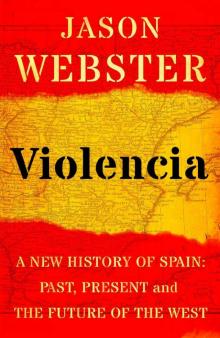 Violencia
Violencia Or the Bull Kills You
Or the Bull Kills You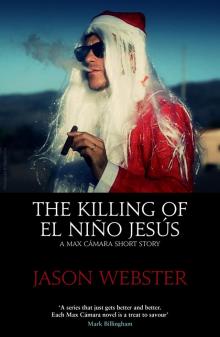 The Killing of El Niño Jesús
The Killing of El Niño Jesús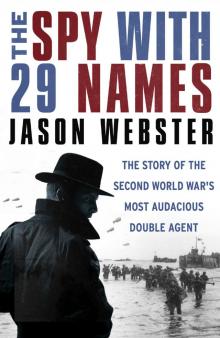 The Spy with 29 Names
The Spy with 29 Names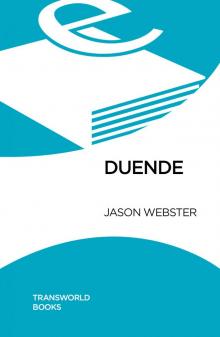 Duende
Duende Guerra
Guerra Sacred Sierra
Sacred Sierra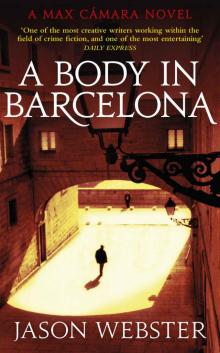 A Body in Barcelona: Max Cámara 5
A Body in Barcelona: Max Cámara 5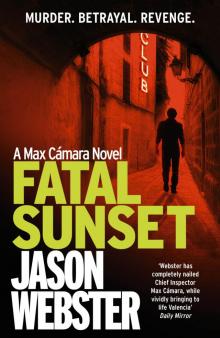 Fatal Sunset
Fatal Sunset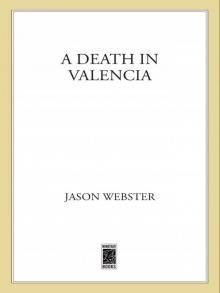 A Death in Valencia
A Death in Valencia Blood Med
Blood Med Andalus
Andalus